Book Chapter

African women’s trajectories and the Casa dos Estudantes do Império
Abstract:
This article compares the trajectories of different women who crossed the Casa dos Estudantes do Império (CEI), a formal institution created in Lisbon by students from the colonies with the support of the Portuguese dictatorial regime in 1944, that became a platform for anti–colonialism. Due to the role played by the CEI in the political and social paths of the leaders of African national liberation movements, historiography has privileged masculine accounts. In contrast, the roles and lives of women linked to the CEI remain unexplored or approached from a vision of “methodological nationalism”, with few exceptions. Addressing these trajectories from a transnational and “Afro–Iberian” lens and through the scrutiny of several sources allows us to reflect on a diversity of gender, race, class, and political ideology. The final aim is to illuminate some aspects of the Afro–Iberian mosaic from a gendered and postcolonial perspective.
Cite this Book Chapter:
Falconi, J. (2024). African women’s trajectories and the Casa dos Estudantes do Império In: Ethnicity and Gender in Portugal and Spain. volume 47, issue 7 (2024), pp. 1403-1419
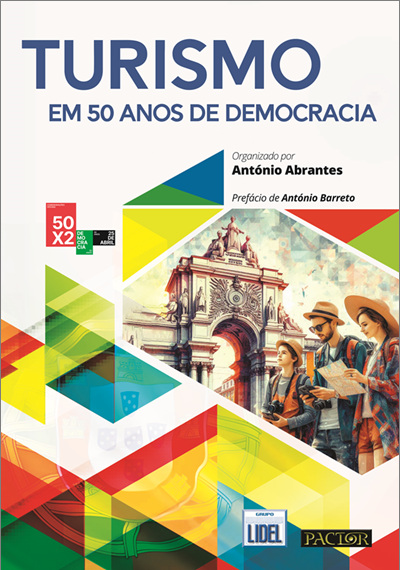
Uma viagem sobre a investigação e a inovação no turismo
Abstract:
This chapter aims to succinctly outline the evolution and trends in the type of research that has been conducted, its connection to knowledge innovation issues, and, above all, whether this trend aligns with the major lines of action in the tourism sector at the international level. Fifty years after April 1974, tourism has established itself both globally and nationally as a resilient and impactful activity on multiple levels, as well as a strategic instrument for strengthening development between countries and peoples.
As a corollary of this dynamism, there has also been a growing recognition of the importance of its role in professional, polytechnic, and university education, as well as the role attributed to research in this field. Research serves as a means to contribute to a thorough understanding of tourism’s significance, informed decision-making, and, naturally, the preparation of a well-trained workforce capable of navigating a highly competitive global market.
Cite this Book Chapter:
Sarmento, E. (2024). Uma viagem sobre a investigação e a inovação no turismo. In António Abrantes, Turismo em 50 anos de democracia (Parte IX- Ensino, Formação e Investigação no Turismo. Cap. 49, pp.398-406). ISBN: 978-989-693-188-9. Lisboa: Pactor/LIDEL
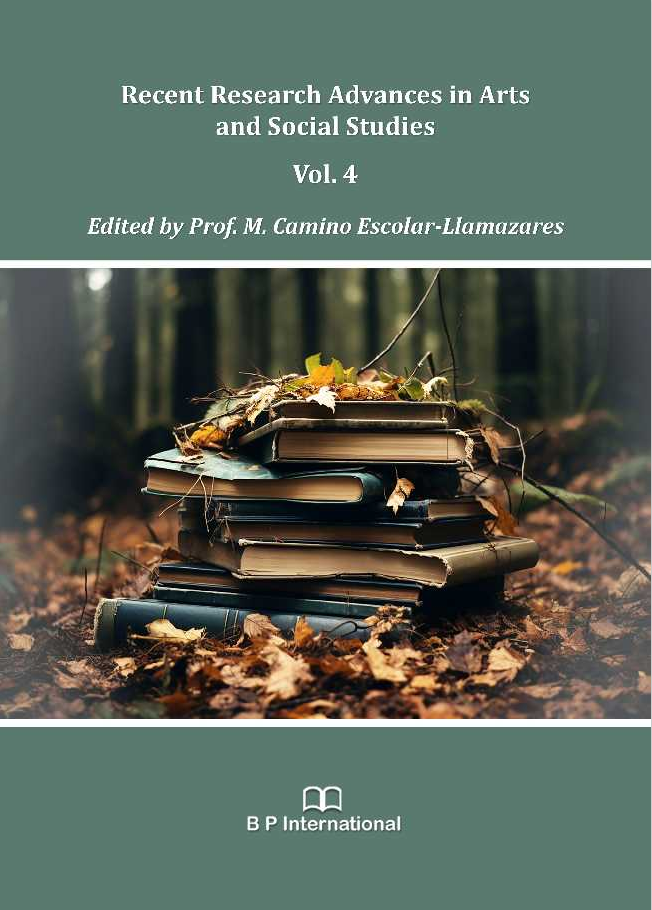
The Values of Portuguese International Development Cooperation: Review and update after 2013
Abstract:
In recent years, International Development Cooperation has assumed particular importance in scientific research and there are currently several studies of general scope or limited to a smaller geographical or thematic space, such as those that focus on national cooperation policies. In general, these works have sought not only to explain its historical, institutional and strategic evolution, but also to constitute a basis for reflection on a long journey of ideas, values and practices that it has been following and its results with partner countries. Portuguese Cooperation is no exception and, in general, all the publications that contextualize it refer directly or indirectly to the general values by which it is governed. However, there aren´t studies that identify the individual reference values of the action of the Cooperation actors in their practice of identifying, managing, and evaluating projects. In this article, we intend to identify the values considered as guiding principles of the action that the actors of the Portuguese Cooperation individually consider in the practices they develop. Such an intention constitutes a real innovation, since the only values identified so far are those that governments include in the strategies presented, more or less inspired by the documents of the European Union (EU) and the Development Assistance Committee (DAC) of the Organization for Economic Co-operation and Development (OECD).
Cite this paper:
Sangreman, Carlos e Raquel Faria (2024). ” The values of Portuguese International Development Cooperation: Review and Update after 2013″. In Recent Research Advances in Arts and Social Studies (Vol. 4), M. Camino Escolar-Llamazares (ed), 148-167. London: B P International
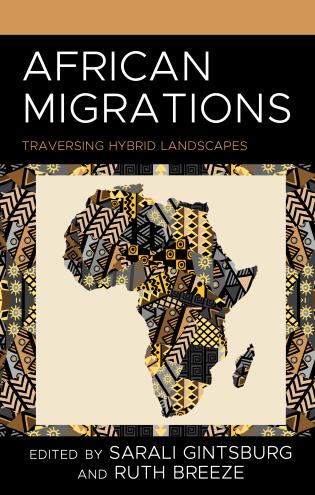
From Angola to Portugal: Narrating Migration, Memory and Identity in Djaimilia Pereira de Almeida’s Work
Abstract:
Based on the teoretichal perspetives of Lusophone Postcolonial Studies, in dialogue with other analytic tools from Feminist Studies, this chapter aims to explore the topics of migration, memory and identity through the close reading of two works of fiction by the Portuguese writer of African descent Djaimilia Pereira de Almeida (1982), who was born in Angola and grew up in Portugal. In the autofiction That Hair (Tin House, 2020; originally published in Portuguese as Esse Cabelo, 2015), as well as in the novel Lisbon, Luanda, Paradise (Lisboa, Luanda, Paraíso, 2018), the main characters move from Angola to Portugal for personal or family reasons and seek to redefine their identities. They give voice to memories and narratives that involve the relationships between the colonial past and the building of contemporary postcolonial identities. In particular, the chapter analyses the representation of both the place of orign and arrival to portray the complex socio-cultural and migratory identity landscapes that emerged during Portuguese colonialism, as well as following the decolonization in Lusophone Africa (1975). In this regard, incluiding also a brief reading of the most recent novel by Almeida, Maremoto (2018), the chapter pays special attention to the perceptions and experiences of the city of Lisbon by narrators and protagonists who are immigrants, in order to reflect on the contemporary configurations of a postcolonial city on the periphery of Europe.
Citation:
Falconi, Jessica (2024) “From Angola to Portugal: Narrating Migration, Memory and Identity in Djaimilia Pereira de Almeida’s Work” in S. Gintsburg & R. Breeze (eds) Afriacan Migration: Traversing Hybrid Landscapes. Lanham: Lexington Books, p. 15-35.
https://rowman.com/ISBN/9781666938708/African-Migrations-Traversing-Hybrid-Landscapes
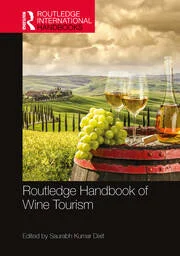
Exploring Co-creation Process in the Wineries: The relevance of social partner characteristics
Abstract:
In a global market, the exchange is regarded as one of the most important strategic resources that are critical for business company success (Hammervoll 2012; Johnson 1999; Powers and Reagan 2007). Hence, it is not a surprise that producers, distributors, retailers, customers, and even competitors join forces to co-create value solutions. With the business environment becoming more competitive, a dyadic perspective of buyer–seller relations is increasing. Partners should be concerned about joining forces and working together to improve their joint performance and add value to their offers (Cannon et al. 2010). In sum, the success of a company can be influenced by the style of the relationship that is developed with other players (Arranz and de Arroyabe 2012; Cunha, Loureiro, and Rego 2015a; Monteiro, Guerreiro and Loureiro 2019; Terpend and Ashenbaum 2012). Following this appeal for research, this chapter aims to explore how distributors and wine producers describe the personal and organizational social capabilities as facilitating facets of relationship quality (RQ) (it is an issue that depends on confidence, satisfaction, commitment, and trust). The wine sector is selected as a field of research because it has unique features which have not yet been deeply studied and could explain management specificities: 1 Portugal is an old wine country full of tradition and heritage, ‘in which the wine culture has been flourishing for centuries’ (Loureiro and Kaufmann 2012, p. 331). 2 The wine sector has not been deeply analyzed and studied in previous research. 3 This sector plays an important role in the national economy, and the recognition of the quality of the work carried out in this sector is being acclaimed internationally. This chapter is organized as follows: after this introduction of our topic research, we present the theoretical background that supported this study, followed by a description of the methodology. The following sections discuss research findings from the empirical study, and the implications for managers of this study are discussed. Finally, limitations and new research directions are suggested.
Quotation:
Sarmento, E. M, Loureiro, S. M. C., and Cunha, N. Exploring Co-creation Process in the Wineries: The relevance of social partner characteristics. In: Dixit, S.K. (Ed.). (2022). Routledge Handbook of Wine Tourism. Routledge. https://doi.org/10.4324/9781003143628
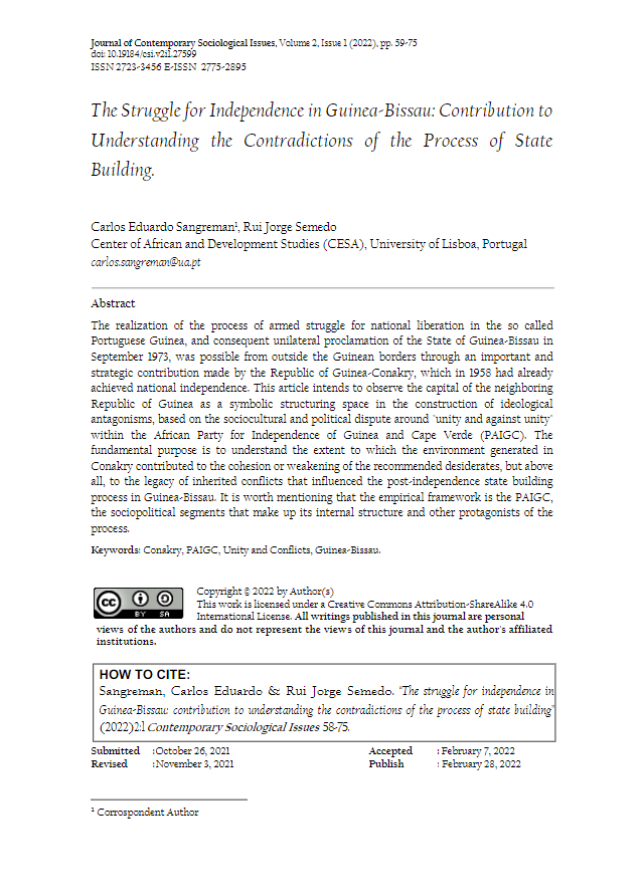
The Struggle for Independence in Guinea-Bissau – Contribution to Understanding the Contradictions of the Process of State Building
Abstract:
The realization of the process of armed struggle for national liberation in the so called Portuguese Guinea, and consequent unilateral proclamation of the State of Guinea-Bissau in September 1973, was possible from outside the Guinean borders through an important and strategic contribution made by the Republic of Guinea-Conakry, which in 1958 had already achieved national independence. This article intends to observe the capital of the neighboring Republic of Guinea as a symbolic structuring space in the construction of ideological antagonisms, based on the sociocultural and political dispute around “unity and against unity” within the African Party for Independence of Guinea and Cape Verde (PAIGC). The fundamental purpose isto understand the extent to which the environment generated in Conakry contributed to the cohesion or weakening of the recommended desiderates, but above all,to the legacy of inherited conflicts that influenced thepost-independence state building processin Guinea-Bissau. It is worth mentioning thatthe empirical framework is the PAIGC, the sociopolitical segments that make up its internal structure and other protagonists of the process.
Quotation:
SANGREMAN, Carlos Eduardo; SEMEDO, Rui Jorge. The Struggle for Independence in Guinea-Bissau. Journal of Contemporary Sociological Issues, [S.l.], v. 2, n. 1, p. 59-75, feb. 2022. ISSN 2775-2895. Available at: <https://jurnal.unej.ac.id/index.php/JCSI/article/view/27599>. Date accessed: 04 may 2023. doi: https://doi.org/10.19184/csi.v2i1.27599.
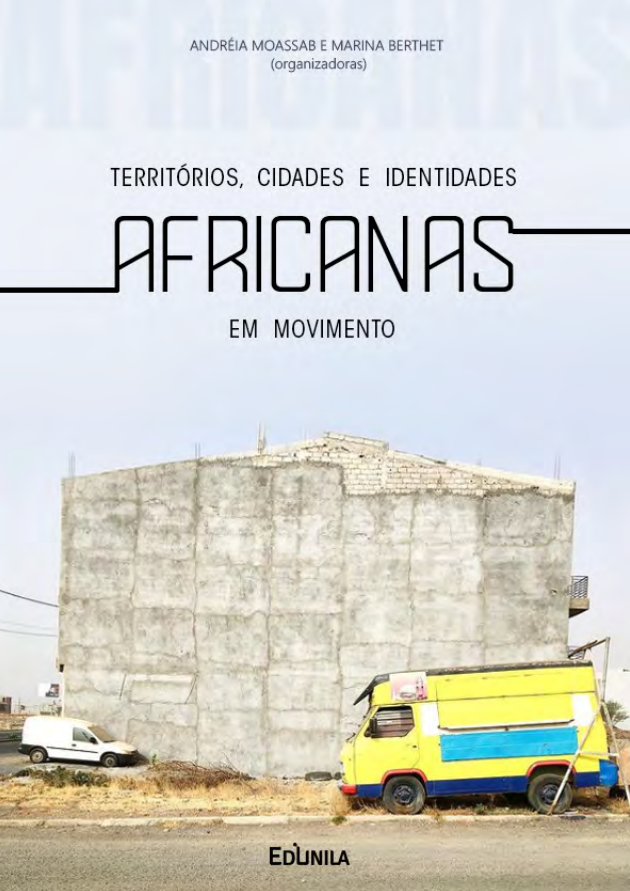
Hip-hop em Cabo Verde: rap e representação do espaço público na cidade da Praia
Abstract:
In Hip-hop em Cabo Verde: rap e representação do espaço público na cidade da Praia, the author studies how, despite the strong link with Portugal and the existence in that country of numerous rap groups composed of Cape Verdeans or descendants of Cape Verdeans, the hip-hop produced there is practically ignored and very little consumed by young people, particularly those from the periphery, to the detriment of the culture of North American black ghettos, known through the audiovisual flows of the digital era. Young people all over the world are seen as a risk factor, an association that is particularly patent in the modern discourse on security, especially in an era in which a part of young people associate themselves with street gangs, revealing “the failure of the expected reproduction of the support mechanisms of an expansive and optimistic capitalism”, which provides the so-called “Welfare State”. Thus, in the face of a feeling of juvenile unease, evidenced in some actions that destabilize the social order and the “Creole morabeza”, it becomes mandatory that the institutions that protect this population layer control them, reprogramming them institutionally, thus building a State Social Service.
Quotation:
Lima, R.W. (2022). Hip-hop em Cabo Verde: rap e representação do espaço público na cidade da Praia: In Territórios, cidades e identidades africanas em movimento. Andréia Moassab, Marina Berthet (Orgs.), 119-133. Foz do Iguaçu: EDUNILA, 2022. ISBN: 978-65-86342-32-1

África, o berço da modernidade: por uma visão pós-colonial da modernidade e do território
Abstract:
In África, o berço da modernidade: por uma visão pós-colonial da modernidade e do território. In Territórios, cidades e identidades africanas em movimento, the author starts by taking a brief look at what is conventionally called modernity and what constitutes the substratum on which the “West” anchors itself for a triumphant and universalist autonarrative. Various authors, mainly from the mid-eighties onwards, have sought to demystify the origins of Western civilisation and modernity, most notably the three volumes of Black Athena: The Afroasiatic Roots of Classical Civilization (1987/1991/2006), by Martin Gardiner Bernal.2 Other authors have followed in Bernal’s footsteps to some extent, one of them being the philosopher and historian Enrique Dussel with his work Política de La Liberación: Historia Mundial y Crítica [Liberation Policy: World History and Critique] (2007): World History and Critique] (2007), in which, situated in the field of postcolonial theory, he argues that Hellenocentrism is the father of Eurocentrism and that, given that the so-called “Greek miracle” by the German Romantics of the eighteenth century does not exist, this means having to start “anew” the history of political philosophy. To this end, he considers it essential to redefine the beginning of modernity. It is worth pointing out that it is “postmodernity” – called the historical period that seeks to overcome, or surpasses, modernity – that will give rise, in Western academia and its satellites, not only to a debate about the “postmodern condition” – or about its being the “cultural logic of late capitalism” – but also about the “vision” of modernity itself. Although many prefer expressions other than “postmodern”, or change their preference -such as Zygmunt Bauman, who starts talking about “liquid modernity”, or Gilles Lipovetsky, who prefers the term “hypermodernity”, or others who talk about “incomplete modernity”, or “late modernity” or “alternative modernities”-, in essence they do not put the emphasis on a critical analysis of the hegemonic Anglo-Saxon periodisation of modernity.
Quotation:
Barros-Varela, O. (2022). África, o berço da modernidade: por uma visão pós-colonial da modernidade e do território. In Territórios, cidades e identidades africanas em movimento. Andréia Moassab, Marina Berthet (Orgs.), 11-31. Foz do Iguaçu: EDUNILA, 2022. ISBN: 978-65-86342-32-1
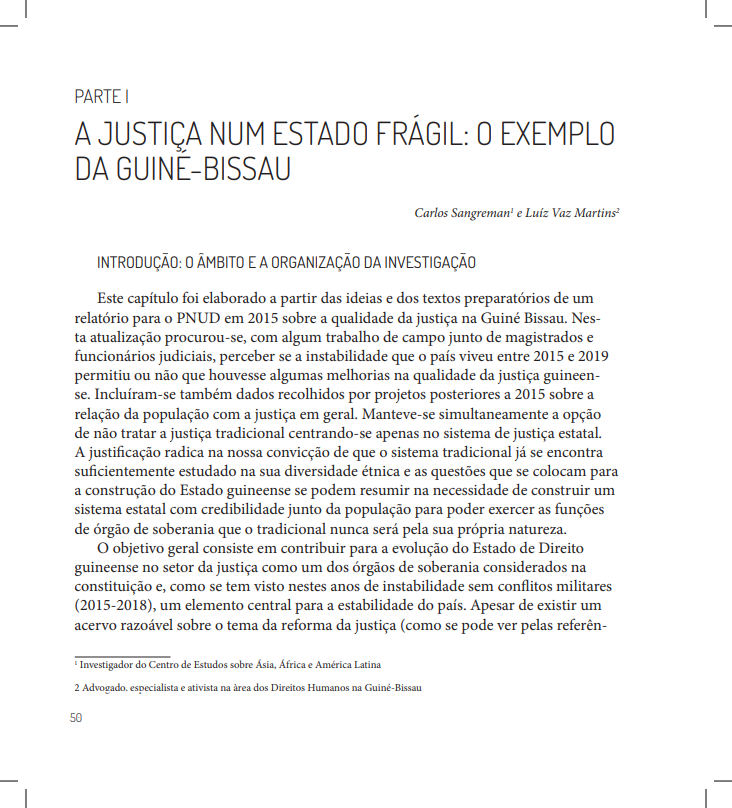
Qualidade da Justiça na Guiné-Bissau. Avaliação e recomendações.
Abstract:
The debate on justice is fundamental to understanding the conditions for the realisation of fundamental rights. The reflection on justice and human rights in Guinea-Bissau, which permeates the project “Cooperation in the Promotion of Human Rights: the case of Justice in Guinea-Bissau in the Rights Observatory”, promoted by ACEP and CEsA and funded by Camões-ICL, is part of the work of both organisations with the Guinean League of Human Rights in the Rights Observatory. Since 2015, this Observatory has been collecting and analysing data, throughout the territory of Guinea-Bissau, on the realisation of social and economic rights, and the reflection on justice represents a contribution to stimulating debate and knowledge on one of the most important monitoring areas for the country’s development. Furthermore, ACEP participated, as an associated organisation, in a project of the Guinean Human Rights League on impunity in Guinea-Bissau, and researchers from CEsA have carried out research and published articles on justice, the State and international cooperation in this country. Qualidade da Justiça na Guiné-Bissau. Avaliação e recomendações was prepared based on the ideas and preparatory texts of a report for UNDP in 2015 on the quality of justice in Guinea-Bissau. This update sought, through some fieldwork with magistrates and judicial officials, to understand whether or not the instability that the country experienced between 2015 and 2019 allowed for some improvements in the quality of justice in Guinea-Bissau. It also included data collected by projects after 2015 on the population’s relationship with justice in general. At the same time, the option of not dealing with traditional justice was maintained, focusing only on the state justice system.
Quotation:
Sangreman, Carlos e Luis Vaz Martins (2019). “Qualidade da Justiça na Guiné-Bissau. Avaliação e recomendações”.In Justiça e direitos humanos na Guiné-Bissau, Debates e Perspetivas. ISBN 978-989-8625-18-2, 2019, ACEP e CESA, Lisboa.
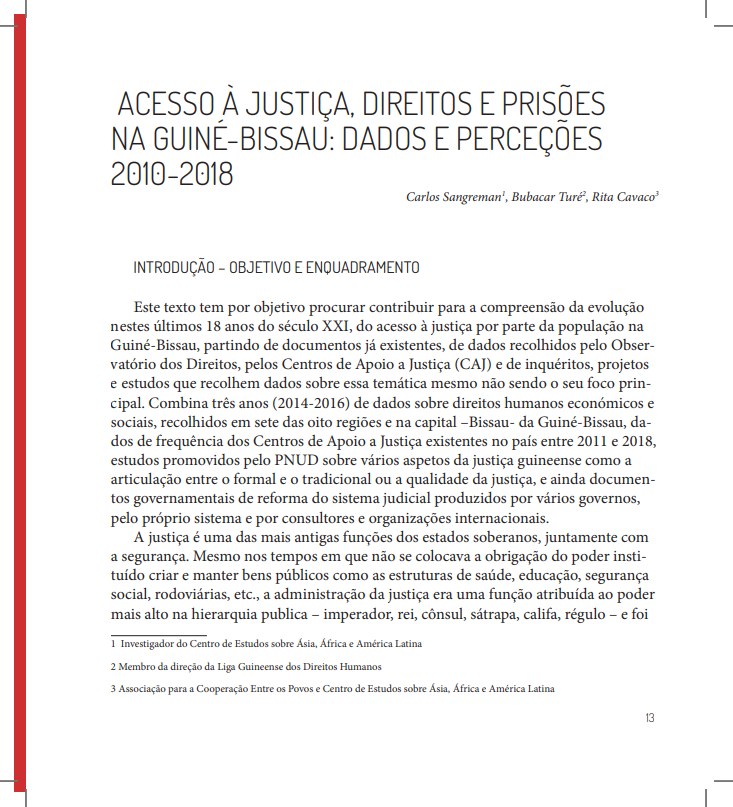
Acesso a Justiça, Direitos e Prisões na Guiné – Bissau. Dados e Perceções 2010-2018
Abstract:
The debate on justice is fundamental to understanding the conditions for the realisation of fundamental rights. The reflection on justice and human rights in Guinea-Bissau, which permeates the project “Cooperation in the Promotion of Human Rights: the case of Justice in Guinea-Bissau in the Rights Observatory”, promoted by ACEP and CEsA and funded by Camões-ICL, is part of the work of both organisations with the Guinean League of Human Rights in the Rights Observatory. Since 2015, this Observatory has been collecting and analysing data, throughout the territory of Guinea-Bissau, on the realisation of social and economic rights, and the reflection on justice represents a contribution to stimulating debate and knowledge on one of the most important monitoring areas for the country’s development. Furthermore, ACEP participated, as an associated organisation, in a project of the Guinean Human Rights League on impunity in Guinea-Bissau, and researchers from CEsA have carried out research and published articles on justice, the state and international cooperation in this country. Acesso a Justiça, Direitos e Prisões na Guiné – Bissau. Dados e Perceções 2010-2018 aims to contribute to the understanding of the evolution of access to justice by the population in Guinea-Bissau over the last 18 years of the 21st century, based on existing documents, data collected by the Observatory of Rights, the Justice Support Centres (CAJ) and surveys, projects and studies that collect data on this theme even though it is not their main focus.
Quotation:
Sangreman, Carlos, Bubacar Turé e Rita Cavaco (2019). “Acesso a Justiça, Direitos e Prisões na Guiné – Bissau. Dados e Perceções 2010-2018”.in Justiça e direitos humanos na Guiné-Bissau, Debates e Perspetivas. ISBN 978-989-8625-18-2, 2019, ACEP e CESA, Lisboa.





